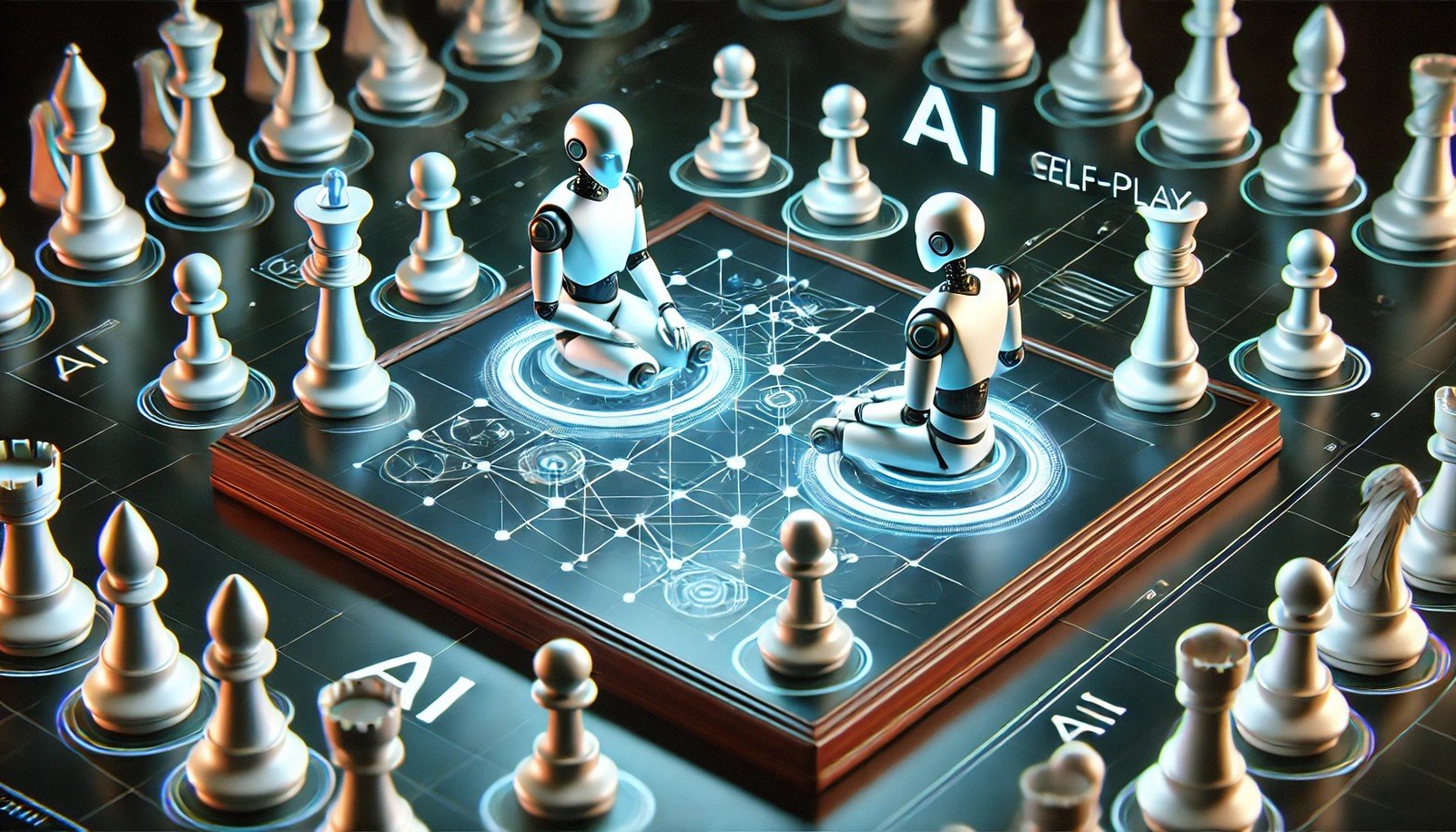Self-Play

Quick Navigation:
- Self-Play Definition
- Self-Play Explained Easy
- Self-Play Origin
- Self-Play Etymology
- Self-Play Usage Trends
- Self-Play Usage
- Self-Play Examples in Context
- Self-Play FAQ
- Self-Play Related Words
Self-Play Definition
Self-Play is a method in artificial intelligence, specifically in reinforcement learning, where an algorithm is programmed to play games or perform tasks against itself. This iterative self-competition allows the AI to learn strategies, optimize its actions, and improve over time without needing external data. Self-Play has been integral in advancing game-playing AIs, like those for chess, Go, and other strategic games, as it allows the model to refine its skills through constant, self-generated feedback.
Self-Play Explained Easy
Imagine you’re playing a game alone, and each time you make a move, you pretend to be the opponent too. As you keep playing, you get better because you learn what moves work best and which ones don’t. Self-Play in AI is like that! The computer plays both sides of a game to figure out the best strategies by playing over and over.
Self-Play Origin
Self-Play has origins in game theory and reinforcement learning. It emerged as a technique in AI development as researchers sought ways for algorithms to improve independently. Early experiments in Self-Play were primarily theoretical, but as computational power grew, applications like DeepMind’s AlphaGo showcased its potential.
Self-Play Etymology
The term “Self-Play” describes the AI’s method of playing against itself, leveraging its own actions as feedback to learn and improve.
Self-Play Usage Trends
Over recent years, Self-Play has become increasingly popular in the AI field, especially within reinforcement learning applications. Its success in games, simulations, and optimization tasks has inspired more research on how Self-Play can be applied outside gaming, such as in autonomous driving and robotics.
Self-Play Usage
- Formal/Technical Tagging:
- Reinforcement Learning
- Game AI
- Autonomous Systems - Typical Collocations:
- "self-play algorithm"
- "training through self-play"
- "self-improving AI"
- "reinforcement learning with self-play"
Self-Play Examples in Context
- A self-play algorithm enables an AI to become a master at chess by continuously playing games against itself and learning from each match.
- In training autonomous vehicles, Self-Play can be used in simulations where the AI navigates different driving scenarios without external input.
- AI systems use Self-Play in digital gaming environments to develop strategies that exceed human performance levels.
Self-Play FAQ
- What is Self-Play in AI?
Self-Play is a technique in AI where the algorithm plays games or completes tasks against itself to improve performance. - How does Self-Play help AI training?
It allows AI to optimize strategies and skills by learning from repeated self-competition, without needing external data. - Where is Self-Play commonly used?
It’s used in game AI, robotics, simulations, and autonomous vehicle training. - Why is Self-Play important in reinforcement learning?
It helps AIs learn independently, building resilience and efficiency through iterative self-learning. - What are examples of Self-Play applications?
Applications include AlphaGo, autonomous driving simulations, and robotic task training. - Does Self-Play require human intervention?
No, Self-Play enables AI to train without human guidance by relying on self-generated data. - What challenges does Self-Play face?
Challenges include the need for substantial computational resources and the risk of the AI developing suboptimal strategies. - Can Self-Play be used in non-game environments?
Yes, Self-Play is applicable in robotics, autonomous systems, and complex simulations. - How does Self-Play improve AI decision-making?
It refines AI choices through repetitive, scenario-based learning, enhancing decision-making accuracy. - Is Self-Play suitable for real-time applications?
With optimization, Self-Play can support real-time decision-making in dynamic environments.
Self-Play Related Words
- Categories/Topics:
- Reinforcement Learning
- Machine Learning
- Autonomous Systems
Did you know?
Self-Play was a pivotal technique in the development of AlphaGo, the AI that defeated the world champion Go player. By training through millions of self-played games, AlphaGo developed strategies never before seen in human play, revolutionizing approaches in both AI and Go itself.
PicDictionary.com is an online dictionary in pictures. If you have questions or suggestions, please reach out to us on WhatsApp or Twitter.Authors | Arjun Vishnu | @ArjunAndVishnu

I am Vishnu. I like AI, Linux, Single Board Computers, and Cloud Computing. I create the web & video content, and I also write for popular websites.
My younger brother, Arjun handles image & video editing. Together, we run a YouTube Channel that's focused on reviewing gadgets and explaining technology.



Comments powered by CComment